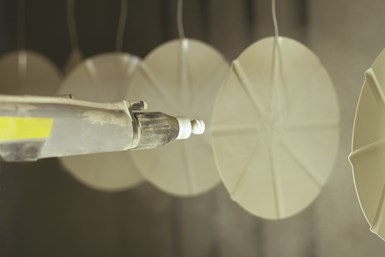Touch-up Options for Powder Coated Parts
Is it true that powder coating cannot be touched up? Powder coating expert Rodger Talbert offers options for powder coating touch-ups.
Q: I’ve been told that a powder-coated part cannot be “touched-up.” I have some patio furniture that I had powder coated and the powder coating shop that did the work for me stripped the threads in holes used to rack the part. I can fix the threads by welding up the hole and re-taping the threads. The shop states the whole piece will need to be redone and they cannot address just the small area affected by the repair. Is this accurate? Is it true that powder coating cannot be touched up?

A: You cannot touch up a small area of a powder coated part with powder. It will leave a visible parting line between the original coated area and the touch-up area that is dry and rough looking. You may want to consider touching up with a liquid paint. Typical aerosol paints will not have the same performance as the powder but they can cover up an area cosmetically and you should be able to match the powder color pretty closely if not perfectly. If the area is very small this may be acceptable, but you need to know that the aerosol is not as tough as the powder and it may rust or discolor sooner than you want.
In some cases, a part is touched up with a color-matched, two-component polyurethane liquid paint by brush or spray. The parting line may be visible but it is not very obvious if done properly. This will give you better performance. It may not wear or discolor at the same rate as the powder, so color match may be more noticeable over time. If you are concerned about the performance and want perfect appearance, you will need to recoat the whole part after you do the repair. The repair area needs to be cleaned (probably sanded) and then the whole part will receive a second coat. Hopefully, the powder coater will take responsibility for ruining the threads and do this at no charge. The extra layer of powder will be a benefit and will provide better wear over time. One caution: they will need to confirm that the two layers will have good inner-coat adhesion; they can do this by testing a panel to confirm good adhesion.
Large-area touch-up?
Q: I have a quick question about touching up powder paint. What would be the possibility of touching up a large area, let’s say a 12 × 12-inch spot, and curing with a controlled heat source that would concentrate the heat in such a way that it would allow baking of new powder without damaging the outer layer powder surrounding the 12-inch area?
A: Unfortunately, you will not be able to use powder to do an isolated spot of touch-up on a larger surface. When you apply powder over powder you must coat the entire part 100%. The touch-up area will show a very rough and grainy line between the freshly coated area and the original coat.
It would also be very difficult to apply a heat source selectively to a small area and achieve a proper cure, and you may risk discoloration of the original coat.
If you must touch up an area as large as 12 × 12 inches without rerunning the entire part, you could try a liquid touch-up paint. Powder can be color matched with an acrylic spray. These aerosol spray cans are good for small, cosmetic touch-ups but not too good for larger patches — performance of the acrylic will not be as good as the powder, so it may fade or break down in a relatively short period of time.
You can also use a two-component urethane liquid. This will give you better performance, but it will still be hard to avoid leaving a noticeable parting line. The best thing to do from a performance and appearance standpoint is to simply recoat the entire part. Cycle it back through the system and apply a complete second coat.
If you do recoat the part, be aware that the insulated surface will be harder to cover due to electrical resistance. Use low amperage (<20 µA), increase powder flow slightly, and keep the gun a little further from the target than normal. Be sure to get complete coverage; any missed areas will look grainy and dull.
Related Content
Alkaline Cleaning Guide
Gregg Sanko, Senior Chemist, Oakite Products, Inc. provides an overview of the alkaline cleaning process.
Read MoreHow to Maximize Nickel Plating Performance
The advantages of boric acid-free nickel plating include allowing manufacturers who utilize nickel plating to keep up the ever-changing regulatory policies and support sustainability efforts.
Read MoreSolvent Versus Aqueous: Busting the Myths
Is aqueous cleaning “greener” than solvent cleaning? Is solvent a more effective cleaner than aqueous? These and many other questions are answered here to debunk the misconceptions that many manufacturers have held onto for years.
Read MoreTop Reasons to Switch to a Better Cleaning Fluid
Venesia Hurtubise from MicroCare says switching to the new modern cleaning fluids will have a positive impact on your cleaning process.
Read MoreRead Next
Delivering Increased Benefits to Greenhouse Films
Baystar's Borstar technology is helping customers deliver better, more reliable production methods to greenhouse agriculture.
Read MoreEpisode 45: An Interview with Chandler Mancuso, MacDermid Envio Solutions
Chandler Mancuso, technical director with MacDermid Envio discusses updating your wastewater treatment system and implementing materials recycling solutions to increase efficiencies, control costs and reduce environmental impact.
Read MoreA ‘Clean’ Agenda Offers Unique Presentations in Chicago
The 2024 Parts Cleaning Conference, co-located with the International Manufacturing Technology Show, includes presentations by several speakers who are new to the conference and topics that have not been covered in past editions of this event.
Read More











.jpg;maxWidth=300;quality=90)










